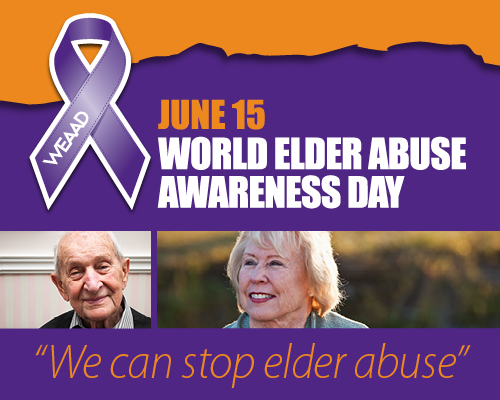All posts
World Elder Abuse Awareness Day 2019
By Paula Mance_
Saturday 15 June is World Elder Abuse Awareness Day. Relationships Australia has been working with families who need help negotiating complex issues related to ageing and to reduce the incidence of elder abuse since 2016.


In 2017-18 more than 10,900 calls were made to elder abuse hotlines across Australia according to new statistics released by the Australian Institute of Health and Welfare.
A large percentage of elder abuse cases go unreported, due to the abused individual being isolated from support networks or unable to access support if they are suffering from a disability such as dementia. However, the World Health Organization estimates that one in six elderly individuals have been the victims of some form of abuse in the last year.
The term, ‘elder abuse’ is used to describe a collection of behaviors that cause distress or harm to an elderly individual, committed by a person in a position or trust or power.
Elder abuse can include a range of varied behaviors and unique personal circumstances, and due to its subjective nature, can be difficult to predict and identify.
Some common examples of abusive behavior towards an elderly person include: the isolation of the elderly person from social connections and support services, withholding mail and phone calls, misusing the older person’s finances, causing physical harm or injury or threatening the elderly person with violence, treating them like a child, or any conduct that causes the elderly person to feel afraid, powerless or humiliated.
In many cases the perpetrator is a family member, such as an adult child, and they may also be the individual who is responsible for the care of the older person. Elder abuse can arise in situations where the older person is vulnerable due to ageing, but can also be a form of intergenerational family violence.
This Saturday 15 June is World Elder Abuse Awareness Day, providing an opportunity for communities globally to advocate for those affected by elder abuse, raise awareness of the signs that someone is suffering from an abusive relationship and promote avenues for securing help.
At a local level, World Elder Abuse Awareness Day is a reminder for us to check in with our vulnerable family members, friends or neighbors to ensure their care adequately addresses their unique situation and needs, in a manner that enhances their quality of life.
Relationships Australia has been working with families who need help negotiating the complex issues related to ageing and reduce the incidence of elder abuse since 2016, through an elder relationship services pilot.
We have since developed a robust counselling and mediation service model that we have rolled out across the nation.
In March 2019, the Australian Government announced a National Plan to Respond to the Abuse of Older Australians. This plan provides an overview of the issues that governments, both state and federal, need to act on as a priority, as well as early agreed actions to address them. It sets out a framework for ongoing cooperation, action and monitoring against key priority areas.
Relationships Australia was successful in securing grants under this National Plan to conduct four Elder Abuse case management and mediation service trials across Australia.
These trial services will be conducted by Relationships Australia Queensland, Relationships Australia Northern Territory, Relationships Australia Canberra and Region, and Relationships Australia Western Australia.
Relationships Australia also offers limited counselling and dispute resolution services to families with ageing-related family issues across more than 30 sites in South Australia, Tasmania, Western Australia, Canberra and Region, New South Wales, Queensland and Victoria
Matters of abuse can be overwhelming and difficult for the older person and their family to navigate without support and guidance; however, this doesn’t mean there is no hope for reaching a resolution, and improving the safety and wellbeing of the older person. With Relationships Australia’s new Senior Relationships Services, an elder can access counselling, conflict resolution services and assistance to have difficult conversations with their families relating to their future care. The older person can access services individually, with their family, or have members of their family engage individually.
If you are interested in more in depth discussion about elder abuse, following the 5th National Elder Abuse Conference in 2018 (sponsored by Relationships Australia) the Seniors Rights Service engaged Ellen Fanning to conduct a series of interviews with experts who attended the conference to discuss aspects of elder abuse and other issues raised at the conference. You can find the videos and other resources here.
Paula Mance is National Policy Manager for Relationships Australia
Back to all posts